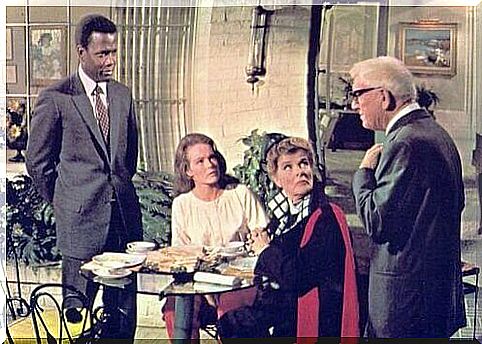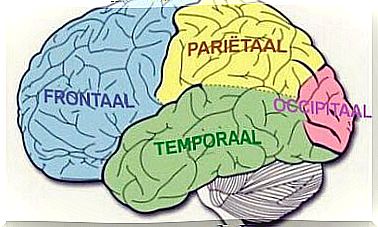If Your Family Influences Your Relationship

When your family influences your relationship, things can get very complicated. You may need to learn to deal with situations that you are not prepared for and have not asked for. While we may not always see it that way, when you choose a particular partner, you also choose his family.
Family dynamics, conflicts and discussions are very common. The journal Psychology Today even published a study that found that three out of four couples have major problems with their in-laws. The study also found that an alarming 60% of women have problems with their partners’ mothers.
In some ways, this may remind us of that wonderful Stanley Kramer movie, Guess Who’s Coming to Dinner . In this film, a young woman becomes engaged to a black man. She then decides to introduce him to her parents. How her parents see the situation is a good summary of what these types of conflicts are often about.
Parents often think that they have raised their children well and instilled certain values, but in the end they choose partners who do not necessarily fit the expectations of the family.
Parents often do not see their children as people who are capable of making their own choices. Instead, they see them as personal projects on which to project their own ideals. This is why parents are often disappointed in their children’s choice of partner.

When your family rejects your partner
There are many different types of families. As Oscar Wilde said, nothing is more sealed and mysterious than the house, where you can close the curtains and no one knows what’s going on behind it.
Of course, some parents are emotionally stable and understand boundaries. These parents are very capable of having respectful and healthy relationships with their children’s other halves.
Sometimes, however, the opposite is true. Sometimes there are toxic, controlling and even authoritarian family dynamics. It is common enough for people to enter into a relationship with someone completely unaware of their toxic family dynamics. The classic example is problems with the in-laws.
However, people often forget that there can be other problems as well. For example, there can be rivalries between siblings, annoying cousins, critical uncles and aunts, grandparents who interfere in everything, etc.
A family can be a small universe with its own laws and dynamics. There may be conflict with older relatives who are trying to enforce their custody or with passive-aggressive mothers. Disagreements about proper parenting are common, as are discussions about religion and politics.
You may feel like your partner’s family doesn’t accept you and you may feel like you’re not good enough. This can throw both you and your relationship completely off balance.
When your family or your partner’s family crosses the line, you need to find a way to redirect the situation without causing unnecessary damage. However, this can be very difficult.

What to do if your family affects your relationship
Some people take it very extreme. For example, by letting their partner choose between them and his family. Some partners end up taking sides. Others choose to remain silent and just let things happen.
Sometimes they become the scapegoat who puts up with everything out of love for their partner. Whichever path is chosen, sooner or later they all lead to some kind of conflict.
As tempting as it may be to want to completely exclude your partner’s family, this usually doesn’t solve the problem. The good news is that there are better options. Here are some strategies that can help:
- Continue to communicate with your significant other continuously. Let your partner know how you feel about what is happening. Avoid criticism. Just try to express the truth about what is happening without disparaging or insulting anyone.
- Every family is different. It is important to distinguish between what is acceptable and what is not. There is a difference between being understanding and letting yourself be mistreated.
- Make agreements with your partner about your limits. You both need to have a clear idea of what you find acceptable and where you draw the line. Even if you and your partner agree on everything, you should set clear rules about your families so that you are all on the same page.
- Also let your family know what you find hurtful or annoying about their behavior. The critical mother-in-law, the intolerant brother, the controlling father… Be assertive and express your discomfort so that they understand the impact of their behavior. Talk about alternatives that could help improve the quality of the relationship.

By tackling the problem, you can make your relationship stronger
Finally, it doesn’t always have to be a bad thing if your family influences your relationship. Sometimes your in-laws can be simply wonderful, very welcoming and even there for you in moments of crisis.
However, if family is negatively affecting your relationship, then you should talk to your partner about how to deal with it. That way you make sure you are on the same page and you can count on your partner’s support in the future when difficult situations arise.
If you deal with family conflicts in a timely and mature manner, your relationship will be better off in the long run. So if your family has an influence on your relationship, the most important thing is to come to an agreement with your partner about what you can do about it.









